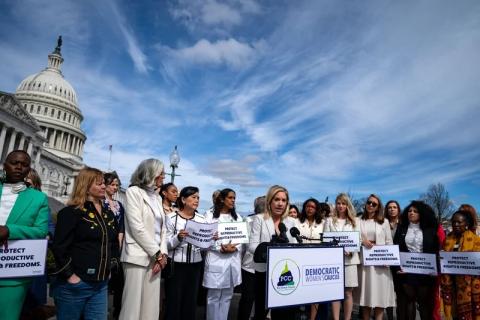Democrats’ State of the Union guests put reproductive rights in spotlight
Democrats invited these women and several others to be guests at President Biden’s State of the Union address on Thursday, showcasing the lives of Americans who have, often unwittingly, become entangled in the politics of reproductive-care restrictions following the U.S. Supreme Court’s decision to overturn Roe v. Wade almost two years ago.
The party is putting access to reproductive care — an issue that has been largely successful for Democrats at the ballot box — front and center in an election year. And the appearances will come after a state court ruling that expanded the fight to protecting access to fertility treatments.
The White House announced in January that first lady Jill Biden’s guest at the address would be Kate Cox, a Texas mother of two who sought an abortion after learning that her fetus had a fatal genetic condition and that continuing to carry the pregnancy to term could jeopardize her health and future fertility. After petitioning a judge to get an abortion in Texas, she eventually left the state for the procedure following a week of legal whiplash.
Sen. Patty Murray (D-Wash.), the Senate’s president pro tempore, brought Kayla Smith, who traveled from Idaho to Washington in 2022 to get an abortion after learning that the fetus she was carrying had fatal abnormalities. Under Idaho’s restrictive abortion laws, Smith said in a statement, she was “forced to seek help outside” the state to terminate her pregnancy.
Rep. Joyce Beatty (D-Ohio) invited Brittany Watts, who was charged with abusing a corpse after experiencing a miscarriage at home. In January, an Ohio grand jury declined to indict Watts. And Rep. Katherine Clark (D-Mass.), the House minority whip, invited Amanda Zurawski to the address. Zurawski, from Texas, was denied an abortion despite her fetus having no chance of survival — and was allowed to deliver only after she became septic, leaving her with permanent physical damage.

Amanda Zurawski, a guest to the State of the Union of Rep. Katherine Clark (D-Mass.) speaks during a news conference held by the Pro-Choice Caucus and Democratic Women's Caucus at the Capitol on Thursday. (Kent Nishimura/Getty Images)
Rep. Judy Chu (D-Calif.) invited Caitlin Bernard, the doctor thrust into the center of a political clash over abortion rights in 2022 when she performed an abortion on a 10-year-old girl. The child, a victim of rape, was forced to travel from Ohio to Indiana for the procedure. And Sen. Tina Smith (D-Minn.) brought Tammi Kromenaker, the director of Red River Women’s Clinic, which was the only abortion provider in North Dakota for more than 20 years before moving its operation to Minnesota to avoid a ban that the overturning of Roe triggered in its home state.
In a show of force during Thursday night’s State of the Union address, members of the Democratic Women’s Caucus wore white and donned “Fighting for Reproductive Freedom” pins.
Democrats are also putting fertility treatment access in the spotlight after Alabama’s state Supreme Court ruled last month that frozen embryos are people and individuals could be liable for destroying them.
Alabama’s decision threw IVF treatment into limbo, leading some women to leave to continue their treatments after nearly every clinic in the state suspended IVF or halted embryo disposal. Since the decision, the Alabama legislature passed legislation to protect IVF providers and patients from criminal or civil liability if the embryos they create are damaged or destroyed. On Wednesday, Alabama Gov. Kay Ivey (R) signed the bill into law.
While several Republicans expressed support for IVF in the wake of the Alabama decision, others have not weighed in on the fetal personhood question at the center of the case. And some Democrats say they fear the unprecedented decision could be replicated in other states. Sen. Tammy Duckworth (D-Ill.), who hosted Illinois reproductive endocrinologist and infertility specialist Amanda Adeleye as her guest on Thursday, sought to pass IVF protections before and after the Alabama decision. Last week, Sen. Cindy Hyde-Smith (R-Miss.) blocked one of those efforts from advancing by unanimous consent.
The first lady’s box at Thursday’s address included Latorya Beasley from Birmingham, Ala., whose embryo transfer was “abruptly canceled as a result of the recent Alabama Supreme Court decision.”
Elizabeth Carr, who became the first baby in the United States born via IVF in 1981, attended as a guest of Sen. Tim Kaine (D-Va.). Senate Majority Leader Charles E. Schumer (D-N.Y.) brought Kate Farley, a Westchester woman who is pregnant as a result of IVF, as one of his guests. Sen. Cory Booker (D-N.J.) invited Roshni Kamta, a Jersey City native who froze her eggs after she received a breast cancer diagnosis at 22. And Sen. Brian Schatz (D-Hawaii) brought Olivia Manayan, OB/GYN chief resident at the University of Hawaii.
The House chamber also hosted several reproductive rights advocates on Thursday night.
Mini Timmaraju, president of Reproductive Freedom for All — the nonprofit formerly known as NARAL — attended as a guest of House Minority Leader Hakeem Jeffries (D-N.Y.). Rep. Gerry Connolly (D-Va.) brought Barbara Collura, the president and CEO of Resolve: The National Infertility Association. And Jodi Hicks, the CEO of Planned Parenthood Affiliates of California, attended as a guest of Rep. Pete Aguilar (D-Calif.), the House Democratic Caucus chairman.